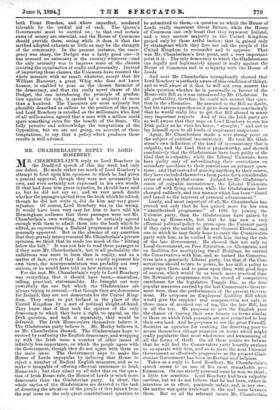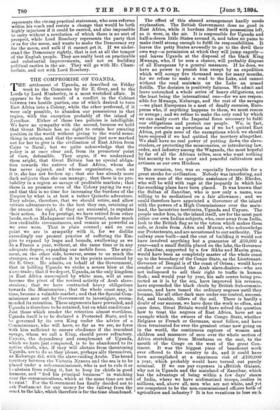MR. CHAMBERLAIN'S REPLY TO LORD ROSEBERY.
MR. CHAMBERLAIN'S reply to Lord Rosebery in the Bradford speech of this day week had only one defect. He made rather too much of Lord Rosebery's attempt to foist upon him opinions to which he had given a general approval, though they were not necessarily his own, and were certainly not expressed in his own words. If that had done him grave injustice, he should have said so, but he did not say so ; and we very much doubt whether the passages quoted from the book which he edited, though he did not write it, did do him any very grave injustice. Of course, Lord Rosebery was in the wrong. It would have been very easy for him to have told his Birmingham audience that these passages were not Mr. Chamberlain's own writing, though he certainly agreed enough with them to admit them into the book which he edited, as representing a Radical programme of which he generally approved. But in the absence of any assertion that they gravely misrepresented Mr. Chamberlain's private opinions, we think that he made too much of the "hitting below the belt." It was not fair to read these passages as if they were Mr. Chamberlain's ; but in all probability the unfairness was more in form than in reality, and as a matter of fact, even if they did not exactly represent his own views, the misrepresentation was probably not very serious, or he would have told us how serious it was.
For the rest, Mr. Chamberlain's reply to Lord Rosebery was everything that it should have been,—masculine, telling, practical, statesmanlike. He brought out very powerfully the one fact which the Gladstonians are always trying to conceal,—that though they are democrats for Ireland, they are not democrats for the United King- dom. They want to put Ireland in the place of the United Kingdom by a sort of political sleight-of-hand. They know that if they took the opinion of the only democracy to which they have a right to appeal, on the Irish question, and took it separately, they would be defeated. The Irish Home-rulers themselves believe it. The Glad stonian party believe it. Mr. Morley believes it, as Mr. Chamberlain showed. The Gladstonians hope to succeed by confusing the English democracy, and wrapping up with the Irish issue a number of other issues of infinitely less importance, on which the people agree with the Government, though they do not agree with them on the main issue. The Government hope to make the House of Lords unpopular by inducing that House to reject a number of Radical English measures, and so to make it incapable of offering effectual resistance to Irish Home-rule ; but they admit on all sides that on the ques- tion of Irish Home-rule, the House of Lords is much more democratic than the Gladstonian party. In short, the whole tactics of the Gladstonians are devoted to the task of diverting the attention of the people of this Island from the real issue on the only great constitutional question to be submitted to them,—a question on which the House of Lords really represent Great Britain, while the House of Commons can only boast that they represent Ireland, and a, very narrow majority in the United Kingdom gained only by those artful tactics ; that is, gained only by stratagems which they dare not ask the people of the United Kingdom to reconsider and to approve. That was Mr. Chamberlain's first point, and a very important point it is. The only democracy to which the Gladstonians can legally and legitimately appeal is really against the House of Commons and in sympathy with the House of Lords.
And next Mr. Chamberlain triumphantly showed that Lord Rosebery is perfectly aware of this condition of things, and so well aware of it that he will not even answer the plain question whether he is personally in favour of the • Home-rule Bill as it was introduced by Mr. Gladstone. In all probability, therefore, he could not answer that ques- tion in the affirmative. He assented to the Bill no doubt, but his various speeches on it go to show most convincingly that he would really like to get that Bill altered in many very important respects. And of this the Irish party are so well aware that they urge on Lord Rosebery to run his Irish policy as he runs his horse, " straight ; " and not to lay himself open to all kinds of unpleasant suspicions. Again, Mr. Chamberlain made a very strong point on the subject of political inconsistency. He took Mr. Glad- stone's own definition of the kind of inconsistency that is culpable, and the kind that is praiseworthy, and showed conclusively that the Gladstonians have been guilty of the kind that is culpable ; while the Liberal Unionists have been guilty only of subordinating their convictions on secondary questions to their convictions on primary ques- tions ; and that instead of gaining anything by their course, they have excluded themselves from power for a considerable series of years by that course. Judged by Mr. Gladstone's canon of culpable inconsistency, the Liberal Unionists come off with flying colours, while the Gladstonians have changed suddenly, and in a manner which has been "timed and tuned to the interests of personal advancement."
Lastly, and most important of all, Mr. Chamberlain has proved not only that he has gained more for his own "unauthorised programme" of 1885 by joining the Unionist party, than the Gladstonians have gained by taking up Home-rule, but that he has now a very effectual political policy to press upon the Unionist party if they carry the nation at the next General Election, and one in which he may fairly hope to carry the Conservative party with him, as he carried it with him during the rule of the late Government. He showed that not only on Local Government, on Free Education, on Allotments, and on facilities for multiplying Small Holdings, he carried the Conservatives with him, and so turned the Conserva- tives into a genuinely Liberal party, but that if the Con- servatives should return to power, he has still a policy to press upon them, and to press upon them with good hope of success, which would be as much more practical than the Newcastle programme with its crowd of competitive omnibuses for the legislative Temple Bar, as the four popular measures carried by the last Conservative Govern- ment were, than the performances of the present Govern- ment. He proposes an Employers' Liability Bill which would give the employ 4 real compensation not only in three cases of accident out of ten, like the late Bill, but in all the ten. He proposes to give the English poor the chance of buying their own houses on terms similar to those on which Irish peasants are now permitted to buy their own land. And he proposes to use the great Friendly Societies as agencies for enabling the deserving poor to secure themselves old-age pensions on terms which might really popularise that most wholesome and humanising of all the forms of thrift. On all these points we believe that he will find the Conservative party heartily anxious to co-operate with him and so to make the next Unionist Government as effectively progressive as the present Glad- stonian Government has been ineffectual and helpless. Taken as a reply to Lord Rosebery, Mr. Chamberlain's speech seems to us one of his most remarkable pei - formances. On one strictly personal issue he was, we think, a little too sensitive. Lord Rosebery had been culpably careless, but we do not believe that he had been, either in intention or in effect, positively unfair, and, in any case, the matter was quite irrelevant to the real issue between them. But on all the relevant issues Mr. Chamberlain represents the strong practical statesman, who sees reforms within his reach and resists a change that would be both highly injurious if it could be carried, and also impossible to carry without a revolution of which there is no sort of prospect, while Lord Rosebery represents the party that cr.es for the moon, and wants to make the Democracy cry for the moon, and sulk if it cannot get it. If we under- stand the Democracy rightly, that is not at all the temper of the English people. They are really bent on practicable and substantial improvements, and not on building political castles in the air. They will go with Mr. Cham- berlain, and not with Lord Rosebery.







































 Previous page
Previous page